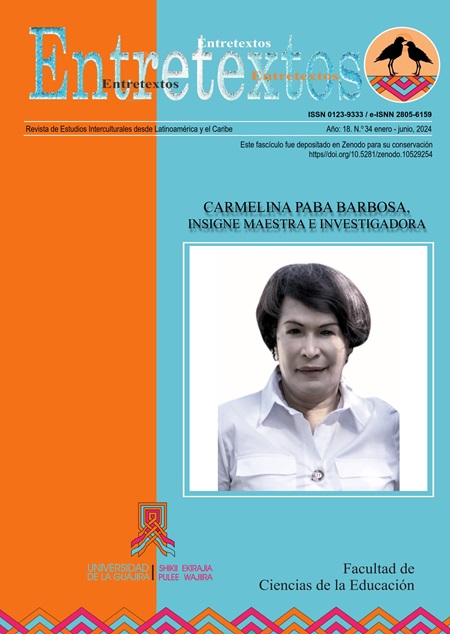Abstract
The loss of the values of her community of origin, the Wayuu, and the rejection she suffers in the alijuna world of Riohacha to which she aspires to integrate, plunges the protagonist of the story into a confusion of feelings that turns her into a being without a center, and situates her in a kind of ethnic limbo that takes the form of a confession in the story, of the irruption of an oral, questioning and creative discourse, which reveals the risks that children and young people run when they venture into the white, western world. and discriminating, prone to take the other as inferior.
References
Berg, Walter Bruno. Apuntes para una historia de la oralidad en la literatura argentina.
De la Hoz Simanca, Jaime (2009) Los wayuu tienen su propia escritora (Entrevista). En: Letralia Tierra de letras. No 212.
Ferrer, Gabriel, RODRÍGUEZ, Yolanda (1998) Etnoliteratura Wayuu: Estudios críticos y selección de textos. Barranquilla, Universidad del Atlántico.
García Canclini (2009) Culturas hibridas. Estrategias para entrar y salir de la modernidad. México. Grijalbo.
Ferro Vidal, Luis (2017). “La voz y su huella, de Martin Lienhard”. En: Boletín de Antropología. Universidad de Antioquia, Medellín, Vol. 30, No. 54, pp. 298-302.
Gutiérrez Espíndola, José Luís (2006) Educación para lo no discriminación. Una propuesta. En: Educación en derechos humanos, México. Secretaría de Relaciones Exteriores, Programa de Cooperación sobre Derechos Humanos.
Ortega, Manuel Guillermo (2007). La literatura wayuu o las aventuras del mito. En: Putchipu Documentos de Análisis. Nuestras Rancherías Virtuales.
Ostria, González, Mauricio (2001). “Literatura oral, oralidad ficticia”. En: Estudios filológicos. No 36 Valdivia
Siosi, Vicenta (1992) “Esa horrible manera de separarme de ti”. En: WOUMMAINPA No 1. Gobernación de La Guajira.
Siosi, Vicenta (1995) “El honroso vericueto de mi linaje”. En: WOUMMAAINPA No 6. Gobernación de La Guajira.
Siosi, Vicenta (2007). El Dulce corazón de la piel cobriza. Riohacha. Fondo de Cultura de La Guajira.

This work is licensed under a Creative Commons Attribution-NonCommercial-NoDerivatives 4.0 International License.
Copyright (c) 2024 Clinton Ramírez Contreras


